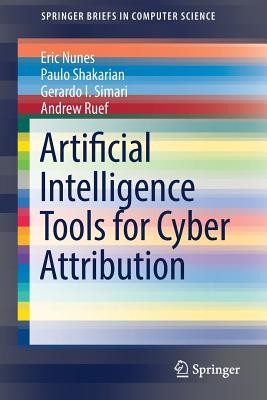
- We will send in 10–14 business days.
- Author: Eric Nunes
- Publisher: Springer
- ISBN-10: 3319737872
- ISBN-13: 9783319737874
- Format: 15.6 x 23.4 x 0.5 cm, minkšti viršeliai
- Language: English
- SAVE -10% with code: EXTRA
Reviews
Description
This SpringerBrief discusses how to develop intelligent systems for cyber attribution regarding cyber-attacks. Specifically, the authors review the multiple facets of the cyber attribution problem that make it difficult for "out-of-the-box" artificial intelligence and machine learning techniques to handle.
Attributing a cyber-operation through the use of multiple pieces of technical evidence (i.e., malware reverse-engineering and source tracking) and conventional intelligence sources (i.e., human or signals intelligence) is a difficult problem not only due to the effort required to obtain evidence, but the ease with which an adversary can plant false evidence.
This SpringerBrief not only lays out the theoretical foundations for how to handle the unique aspects of cyber attribution - and how to update models used for this purpose - but it also describes a series of empirical results, as well as compares results of specially-designed frameworks for cyber attribution to standard machine learning approaches.
Cyber attribution is not only a challenging problem, but there are also problems in performing such research, particularly in obtaining relevant data. This SpringerBrief describes how to use capture-the-flag for such research, and describes issues from organizing such data to running your own capture-the-flag specifically designed for cyber attribution. Datasets and software are also available on the companion website.
EXTRA 10 % discount with code: EXTRA
The promotion ends in 22d.21:52:04
The discount code is valid when purchasing from 10 €. Discounts do not stack.
- Author: Eric Nunes
- Publisher: Springer
- ISBN-10: 3319737872
- ISBN-13: 9783319737874
- Format: 15.6 x 23.4 x 0.5 cm, minkšti viršeliai
- Language: English English
This SpringerBrief discusses how to develop intelligent systems for cyber attribution regarding cyber-attacks. Specifically, the authors review the multiple facets of the cyber attribution problem that make it difficult for "out-of-the-box" artificial intelligence and machine learning techniques to handle.
Attributing a cyber-operation through the use of multiple pieces of technical evidence (i.e., malware reverse-engineering and source tracking) and conventional intelligence sources (i.e., human or signals intelligence) is a difficult problem not only due to the effort required to obtain evidence, but the ease with which an adversary can plant false evidence.
This SpringerBrief not only lays out the theoretical foundations for how to handle the unique aspects of cyber attribution - and how to update models used for this purpose - but it also describes a series of empirical results, as well as compares results of specially-designed frameworks for cyber attribution to standard machine learning approaches.
Cyber attribution is not only a challenging problem, but there are also problems in performing such research, particularly in obtaining relevant data. This SpringerBrief describes how to use capture-the-flag for such research, and describes issues from organizing such data to running your own capture-the-flag specifically designed for cyber attribution. Datasets and software are also available on the companion website.


Reviews